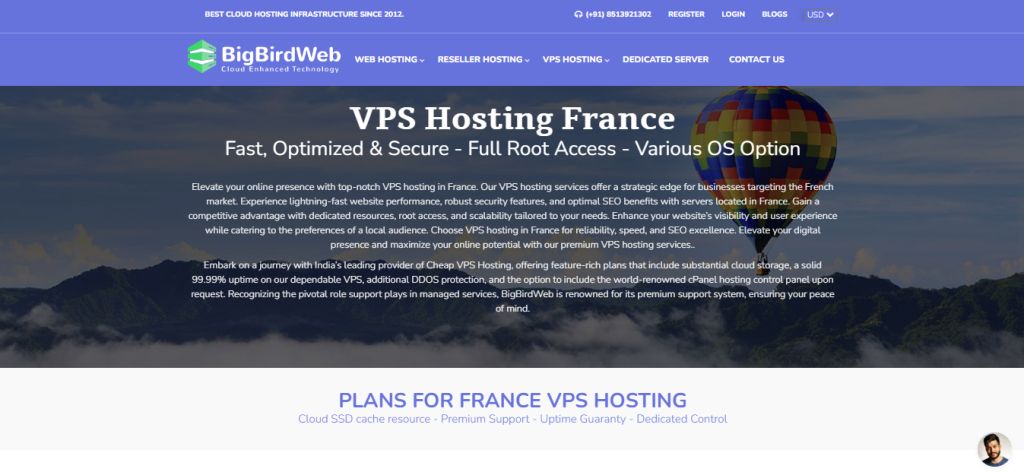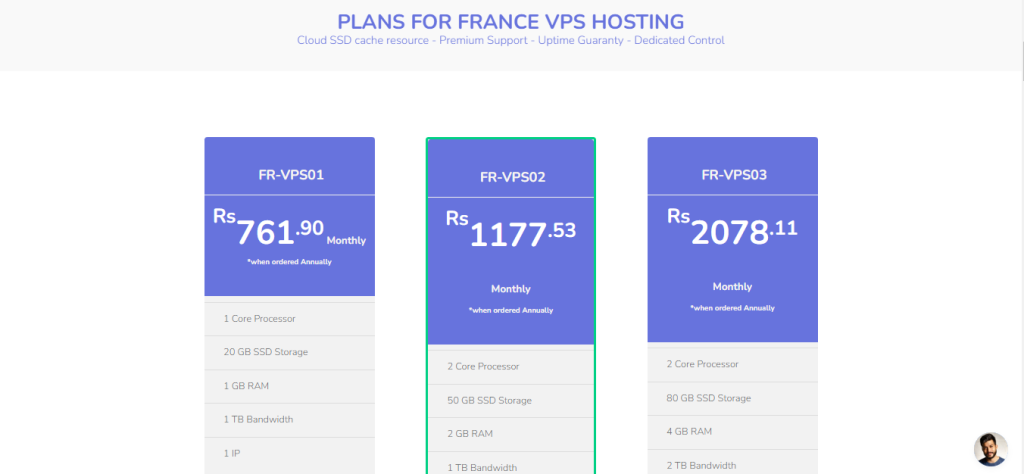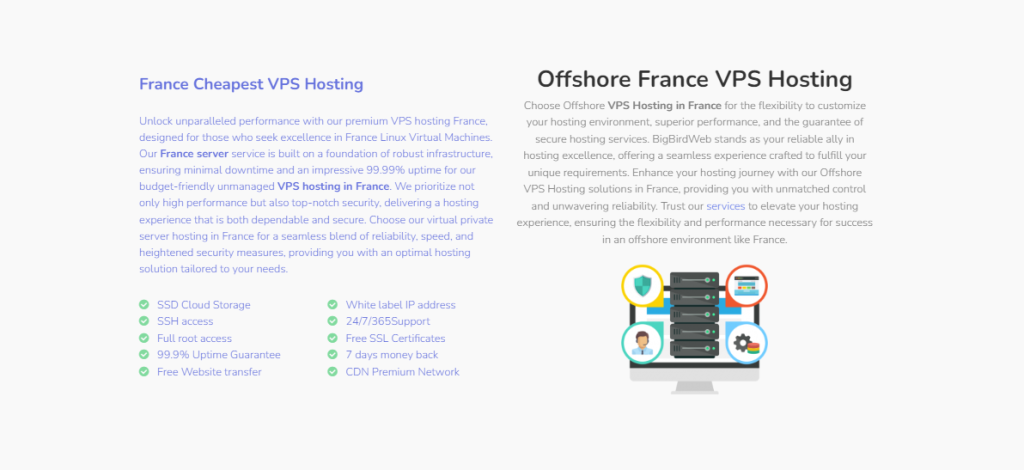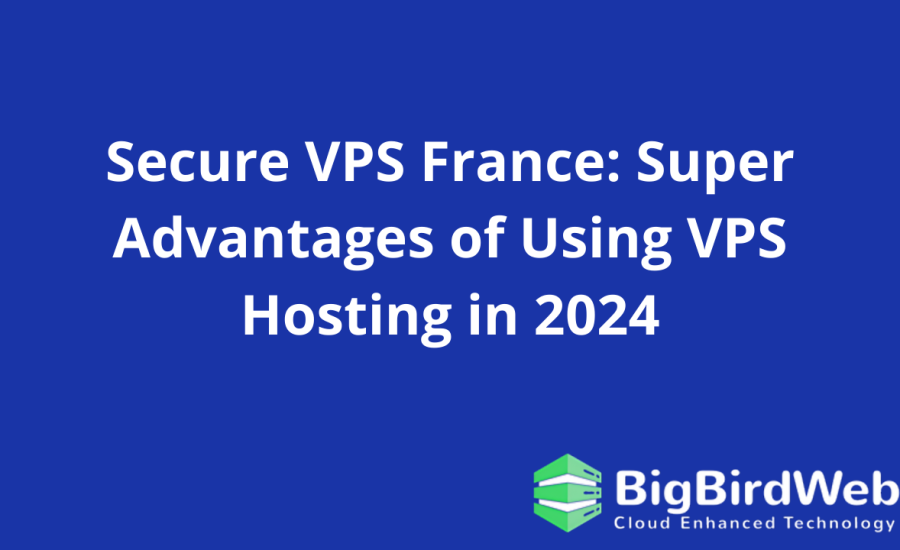When considering secure VPS France solutions, it is essential to understand how Virtual Private Servers (VPS) can enhance the security of your digital assets. VPS hosting provides a robust and isolated environment that can significantly improve security compared to shared hosting solutions. This blog explores the security advantages of using a VPS in France and how these benefits contribute to a safer online experience.

Table of Contents
Why Choose Secure VPS France?

In the realm of hosting, security is a top priority, and choosing a secure VPS France can offer several advantages. By leveraging a VPS, you gain access to a more controlled and protected environment, reducing the risk of security breaches and ensuring better protection for your data.
1. Isolation from Other Users
One of the key benefits of a secure VPS France is the isolation it provides from other users on the same server. Unlike shared hosting, where resources and security are shared among multiple users, a VPS offers a dedicated portion of the server’s resources. This isolation ensures that your data and applications are not affected by the activities of other users.
a. Dedicated Resources
With a VPS, you have access to dedicated resources such as CPU, RAM, and disk space. This means that the performance and security of your VPS are not impacted by the actions of other users on the same physical server. This dedicated environment helps prevent potential security risks associated with shared resources.
b. Customizable Security Settings
A secure VPS France allows you to customize security settings to meet your specific needs. You can configure firewalls, access controls, and other security measures to enhance the protection of your data and applications. This level of customization is not possible with shared hosting, where security settings are often predefined and less flexible.
2. Enhanced Control and Access
VPS hosting in France provides greater control over your server environment, which translates into improved security. With a secure VPS France, you have full administrative access to your server, allowing you to implement and manage security measures effectively.
a. Root Access
Root access gives you complete control over your VPS, enabling you to configure and manage security settings at a granular level. You can install and update security software, monitor server activity, and adjust configurations to enhance security.
b. Custom Security Policies
Having administrative access allows you to define and enforce custom security policies tailored to your requirements. You can implement specific rules for user access, password complexity, and data encryption, ensuring that your VPS aligns with your security standards.
3. Advanced Security Features
A secure VPS France often includes advanced security features designed to protect against various threats. These features enhance the overall security posture of your VPS, providing robust protection for your digital assets. You can also opt for free web hosting.
a. Firewalls
Firewalls play a crucial role in defending your VPS against unauthorized access and malicious attacks. With a French VPS, you can configure both hardware and software firewalls to control inbound and outbound traffic, filtering out potential threats and ensuring only legitimate traffic reaches your server.
b. DDoS Protection
Distributed Denial of Service (DDoS) attacks can overwhelm your server with excessive traffic, causing downtime and performance issues. Many secure VPS France providers offer DDoS protection services to mitigate the impact of such attacks, ensuring that your VPS remains accessible and operational.
c. Intrusion Detection Systems (IDS)
Intrusion Detection Systems (IDS) monitor network traffic and server activity to identify and respond to potential security breaches. By implementing an IDS on your VPS, you can detect suspicious activity in real-time and take appropriate action to prevent unauthorized access.
4. Regular Updates and Patching

Maintaining up-to-date software and applying security patches are essential practices for ensuring the security of your VPS. With a secure VPS France, you have control over software updates and patches, allowing you to address vulnerabilities promptly.
a. Operating System Updates
Regularly updating your operating system is crucial for protecting your VPS against known vulnerabilities. A secure VPS France enables you to manage and apply updates as needed, ensuring that your server remains protected against emerging threats.
b. Application Patching
In addition to operating system updates, it is important to keep applications and software up-to-date with the latest security patches. With a VPS, you have the flexibility to manage application updates and ensure that your server is equipped with the latest security fixes.
5. Data Encryption

Data encryption is a fundamental aspect of securing your VPS and protecting sensitive information. A secure VPS France provides options for encrypting data both at rest and in transit, ensuring that your data remains confidential and secure.
a. Encryption at Rest
Encryption at rest involves encrypting data stored on your VPS’s hard drives. This ensures that even if unauthorized individuals gain physical access to your server, they cannot read the encrypted data without the proper decryption keys.
b. Encryption in Transit
Encryption in transit protects data as it travels between your VPS and other systems, such as users’ browsers or other servers. Implementing Secure Socket Layer (SSL) or Transport Layer Security (TLS) protocols ensures that data transmitted over the internet is encrypted and secure.
6. Backup and Disaster Recovery
Regular backups and a solid disaster recovery plan are essential for minimizing the impact of data loss and system failures. A secure VPS France typically includes backup solutions and disaster recovery options to protect your data and ensure business continuity.
a. Automated Backups
Automated backup solutions create regular snapshots of your data, allowing you to recover information in case of accidental deletion or data corruption. Many VPS providers offer automated backup services as part of their security features.
b. Disaster Recovery Plans
Having a disaster recovery plan in place ensures that you can quickly restore your VPS to a functional state after a significant failure or data loss incident. A secure VPS France often includes options for disaster recovery and data restoration, helping you maintain business operations.
7. Compliance with Regulations
For businesses operating in specific industries or regions, compliance with regulations and standards is crucial. A secure VPS France can help you meet regulatory requirements and ensure that your hosting environment adheres to industry standards.
a. Data Protection Regulations
France, like many other countries, has strict data protection regulations, such as the General Data Protection Regulation (GDPR). Choosing a secure VPS France provider that complies with these regulations helps ensure that your data is handled in accordance with legal requirements.
b. Industry Standards
In addition to data protection regulations, various industries have specific security standards and best practices. A secure VPS France provider that adheres to industry standards can help you meet these requirements and demonstrate your commitment to security.
FAQs
Q1: What is a secure VPS France?
A secure VPS France refers to a Virtual Private Server hosted in France that offers enhanced security features, such as isolation from other users, customizable security settings, advanced security tools, and compliance with data protection regulations.
Q2: How does a secure VPS France differ from shared hosting?
Unlike shared hosting, where resources and security are shared among multiple users, a secure VPS France provides a dedicated portion of the server’s resources, offering better isolation, control, and customization options for enhanced security.
Q3: What are the key benefits of using a secure VPS France?
Key benefits include isolation from other users, advanced security features, greater control over server settings, regular updates and patching, data encryption, automated backups, and compliance with data protection regulations.
Q4: How can I ensure my secure VPS France remains protected?
To keep your secure VPS France protected, regularly update software and applications, implement strong security measures such as firewalls and intrusion detection systems, use encryption, and perform regular backups. Additionally, ensure compliance with relevant data protection regulations.
Q5: What is DDoS protection, and why is it important for a secure VPS France?
DDoS (Distributed Denial of Service) protection helps prevent and mitigate attacks that aim to overwhelm your server with excessive traffic, causing downtime and performance issues. It is important for maintaining the availability and reliability of your secure VPS France.
Q6: How does data encryption contribute to the security of a secure VPS France?
Data encryption ensures that sensitive information is protected both at rest and in transit. Encryption at rest secures stored data, while encryption in transit protects data as it travels between your server and other systems, preventing unauthorized access.
Q7: What role does regular backup play in VPS security?
Regular backups are crucial for protecting your data and ensuring business continuity in case of data loss or system failures. Automated backups and a solid disaster recovery plan help you recover quickly from unexpected incidents.
Q8: How can I customize security settings on my secure VPS France?
With root access to your secure VPS France, you can customize security settings such as firewall rules, access controls, and security policies. This flexibility allows you to tailor the security measures to your specific needs and requirements.
Q9: Are secure VPS France providers compliant with data protection regulations?
Many secure VPS France providers comply with data protection regulations such as GDPR. Choosing a provider that adheres to these regulations helps ensure that your data is handled in accordance with legal requirements and industry standards.
Q10: What should I look for in a secure VPS France provider?
When selecting a secure VPS France provider, look for features such as isolation from other users, advanced security tools, customizable settings, compliance with regulations, and reliable customer support. These factors contribute to a secure and well-managed VPS hosting environment.
Bonus Content: Best Practices for Securing Your French VPS
To further enhance the security of your secure VPS France, consider implementing the following best practices:
1. Regular Security Audits
Conduct regular security audits to identify potential vulnerabilities and weaknesses in your VPS environment. Security audits can help you assess the effectiveness of your current security measures and make necessary adjustments to improve overall protection.
a. Vulnerability Scanning
Use automated tools to perform vulnerability scans on your VPS. These scans can identify common security issues such as outdated software, weak passwords, and misconfigurations. Addressing these vulnerabilities promptly can prevent potential security breaches.
b. Penetration Testing
Penetration testing involves simulating real-world attacks to identify potential security weaknesses. By conducting penetration tests, you can gain insights into how an attacker might exploit vulnerabilities in your VPS and take steps to mitigate these risks.
2. Implementing Multi-Factor Authentication (MFA)
Multi-Factor Authentication (MFA) adds an extra layer of security to your VPS by requiring multiple forms of verification before granting access. Implementing MFA can significantly reduce the risk of unauthorized access, even if an attacker obtains your login credentials.
a. Two-Factor Authentication (2FA)
Two-Factor Authentication (2FA) requires users to provide two forms of verification, typically something they know (password) and something they have (a mobile device or hardware token). Enabling 2FA for administrative access to your VPS enhances security by adding an additional verification step.
3. Using Strong Passwords and Regularly Updating Them
Ensure that all user accounts on your VPS use strong, unique passwords. Avoid using easily guessable passwords and implement policies that require regular password updates to minimize the risk of unauthorized access.
a. Password Policies
Establish password policies that enforce complexity requirements, such as a minimum length, the inclusion of uppercase and lowercase letters, numbers, and special characters. Regularly review and update these policies to ensure they remain effective.
4. Monitoring and Logging
Implement monitoring and logging solutions to keep track of server activity and detect potential security incidents. Regularly reviewing logs can help you identify suspicious behaviour and respond to security threats promptly.
a. Intrusion Detection and Prevention Systems (IDPS)
Intrusion Detection and Prevention Systems (IDPS) monitor network traffic and server activity for signs of malicious behaviour. By deploying an IDPS on your VPS, you can detect and respond to security incidents in real time.
b. Log Management
Use log management tools to collect and analyze server logs. Regularly reviewing logs can help you identify patterns of suspicious activity, investigate security incidents, and maintain compliance with regulatory requirements.
5. Keeping Software and Applications Updated
Regularly update all software and applications running on your VPS to ensure they have the latest security patches. Outdated software can contain vulnerabilities that attackers can exploit to gain unauthorized access to your server.
a. Automated Updates
Configure automated updates for your operating system and critical applications to ensure they receive security patches promptly. Automated updates reduce the risk of human error and ensure that your VPS remains protected against known vulnerabilities.
6. Implementing Network Security Measures
Enhance the security of your VPS by implementing network security measures such as firewalls, virtual private networks (VPNs), and segmentation.
a. Firewalls
Configure firewalls to control inbound and outbound traffic to your VPS. By setting up firewall rules, you can restrict access to only trusted IP addresses and block potentially malicious traffic.
b. Virtual Private Networks (VPNs)
Use VPNs to encrypt data transmitted between your VPS and remote clients. VPNs create secure connections over the internet, protecting sensitive information from interception by unauthorized parties.
c. Network Segmentation
Segment your network to isolate critical systems and sensitive data from less secure parts of your network. Network segmentation reduces the attack surface and limits the potential impact of a security breach.
7. Educating Users and Administrators
Educate users and administrators about security best practices and the importance of following established security policies. Regular training can help raise awareness about common security threats and promote a culture of security within your organization.
a. Security Awareness Training
Provide regular security awareness training to all users and administrators. Training sessions should cover topics such as phishing, social engineering, password management, and the importance of applying security patches.
b. Access Control Policies
Implement access control policies that restrict administrative access to only those who need it. Enforce the principle of least privilege, ensuring that users have only the permissions necessary to perform their tasks.
8. Conducting Regular Backups
Regular backups are essential for protecting your data and ensuring business continuity. Implement a comprehensive backup strategy that includes regular backups of critical data and system configurations.
a. Automated Backup Solutions
Use automated backup solutions to schedule regular backups of your VPS. Automated backups reduce the risk of data loss due to human error and ensure that your data is consistently protected.
b. Offsite Backups
Store backups in offsite locations to protect against data loss due to physical disasters, such as fires or floods. Offsite backups ensure that you can recover your data even if your primary server is compromised.
9. Implementing Security Information and Event Management (SIEM)
Security Information and Event Management (SIEM) solutions collect and analyze security data from various sources, providing a comprehensive view of your security posture. Implementing a SIEM solution can help you detect and respond to security incidents more effectively.
a. Centralized Logging and Analysis
SIEM solutions centralize logging and analysis, allowing you to correlate events from multiple sources and identify potential security threats. Centralized logging simplifies the process of investigating security incidents and maintaining compliance with regulatory requirements.
